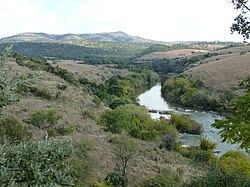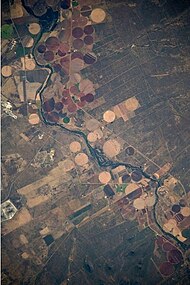Crocodile River (Limpopo)
| Crocodile River Afrikaans: Krokodilrivier | |
|---|---|
 Crocodile River at Pelindaba, North West | |
 | |
| Native name | Tswana: Oodi |
| Location | |
| Country | South Africa |
| Province | Gauteng, North West and Limpopo |
| Physical characteristics | |
| Source | Witwatersrand |
| • location | Witpoortjie, Gauteng |
| • coordinates | 26°07′23″S 27°49′48″E / 26.123°S 27.830°E / -26.123; 27.830 |
| • elevation | 1,710 m (5,610 ft) |
| Mouth | Limpopo River |
• location | Dwaalboom, Limpopo |
• coordinates | 24°11′27″S 26°52′22″E / 24.19083°S 26.87278°E / -24.19083; 26.87278 |
• elevation | 872 m (2,861 ft) |
| Length | 423 km (263 mi) |
| Basin size | 29,572 km2 (11,418 sq mi) |
| Basin features | |
| Progression | Limpopo River → Indian Ocean |
The Crocodile River (Tswana: Oodi,[1] Afrikaans: Krokodilrivier) is a river in South Africa. At its confluence with the Marico River, the Limpopo River is formed.[2]
Course
[edit]
The Crocodile River has its source in the Witwatersrand ridge, originating in Constantia Kloof, Roodepoort, Gauteng province. The first dam on the river is the Lake Heritage Dam just west of Lanseria International Airport. Just north of this airport is its confluence with the Jukskei River. Further downstream into the North West province are the Hartbeespoort Dam[3] and the Roodekoppies Dam. Beyond the Hartbeespoort Dam, the stream passes the town of Brits. The Elands River joins downstream from the Vaalkop Dam, about 20 km further the Pienaars River joins its right bank, shortly after exiting the Klipvoor Dam.
In Limpopo province, about 35 km further, the river passes the town of Thabazimbi and meanders for many kilometres through a sparsely inhabited area before joining the Marico River just west of Rooibokkraal at the limit of North West province to form the start of the Limpopo River.[4]
Tributaries
[edit]The tributaries of the Crocodile River include the Bloubankspruit, Hennops River, Jukskei River, Magalies River, Sterkstroom River, Rosespruit, Skeerpoort River, Kareespruit, Elands River, Bierspruit River and Sundays River.[5]
Pollution
[edit]
The Crocodile River is one of the most polluted river systems in South Africa. The effects of pollution from two of South Africa's metropolitan areas, Johannesburg and Tshwane, has been detrimental to the ecology of the system. Untreated industrial, mining, agricultural and household waste has deteriorated the water quality throughout most of its course and led to massive algal blooms in the Hartbeespoort Dam and Roodekoppies Dam. Invasive plant species have negatively affected the integrity of the system. Unsustainable farming practices have led to sediment overloads and erosion further harming the river.
Dams
[edit]
The Crocodile River is part of the Crocodile (West) and Marico Water Management Area. Dams in the river basin are:
- Hartbeespoort Dam
- Roodekoppies Dam
- Rietvlei Dam, in the Rietvlei River
- Bon Accord Dam and Leeukraal Dam, in the Apies River
- Klipvoor Dam and Roodeplaat Dam, in the Pienaars/Moretele River
- Vaalkop Dam, in the Elands River
- Bospoort Dam, in the Hex River (Matshukubjana)
See also
[edit]References
[edit]- ^ Morton, Fred. "Fenders of Space: Kgatla Territorial Expansion Under Boer and British Rule, 1840–1920". Indigenous Southern African Responses to Colonialism, 1840-1930: 21–46.
- ^ Major rivers and streams within the Limpopo River Basin
- ^ Hartbeespoort Dam History Archived 2012-07-07 at archive.today
- ^ Mokolo and Crocodile River (West)
- ^ Crocodile/Marico WMA 3
External links
[edit]- Overview of the Crocodile (West)/Marico Water Management Area Archived 2018-04-19 at the Wayback Machine
- Natural and anthropogenic influences on water quality: an example from rivers draining the Johannesburg Granite Dome
- A river runs through Limpopo Province
- The influence of land use on water quality and diatom community structures in urban and agriculturally stressed rivers
- Webarchive template archiveis links
- Articles with short description
- Short description is different from Wikidata
- Use South African English from November 2024
- All Wikipedia articles written in South African English
- Articles containing Afrikaans-language text
- Infobox mapframe without OSM relation ID on Wikidata
- Articles containing Tswana-language text
- Pages using gadget WikiMiniAtlas
- Commons category link is on Wikidata
- Webarchive template wayback links
- Pages using the Kartographer extension

